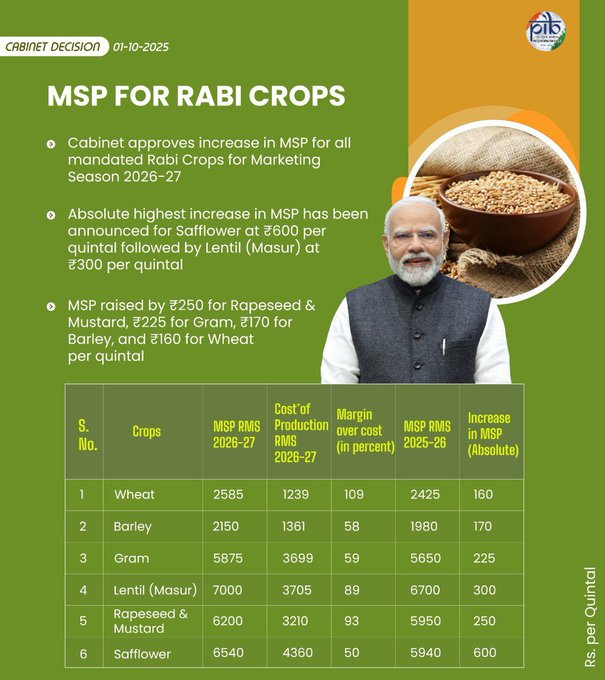Context:
On October 1, 2025, the Cabinet Committee on Economic Affairs (CCEA), chaired by Prime Minister Narendra Modi, approved an increase in the Minimum Support Prices (MSP) for all mandated Rabi crops for the 2026-27 marketing season. This decision aims to ensure remunerative prices for farmers and encourage the cultivation of essential crops.
MSP of Key Rabi Crops:
The approved MSPs for major Rabi crops are as follows:
-
- Wheat: ₹2,585 per quintal (an increase of ₹160 from the previous season)
- Barley: ₹2,150 per quintal (an increase of ₹170)
- Gram (Chana): ₹5,875 per quintal (an increase of ₹225)
- Lentil (Masur): ₹7,000 per quintal (an increase of ₹300)
- Rapeseed and Mustard: ₹6,200 per quintal (an increase of ₹250)
- Safflower: ₹6,540 per quintal (an increase of ₹600)
- Wheat: ₹2,585 per quintal (an increase of ₹160 from the previous season)

Rationale behind hike in MSP:
-
- Ensure fair and remunerative prices for farmers
- Encourage the cultivation of pulses and oilseeds
- Promote self-sufficiency in essential agricultural commodities
- Ensure fair and remunerative prices for farmers
Implications for Farmers:
The increased MSPs are expected to:
-
- Provide better returns to farmers, thereby improving their income levels
- Encourage the cultivation of pulses and oilseeds, which are vital for nutritional security
- Reduce dependence on imports of these commodities
- Provide better returns to farmers, thereby improving their income levels
About Minimum Support Price (MSP):
Minimum Support Price (MSP) is the minimum price at which the government guarantees to purchase certain crops from farmers. It is considered a protective measure that ensures farmers receive a price that is remunerative and protects them from market fluctuations that might lead to losses.
Key Features of MSP:
-
- Government Procurement: The MSP is the price at which government agencies, such as the Food Corporation of India (FCI) and other state agencies, procure crops from farmers.
- Recommendations by CACP: The Commission for Agricultural Costs and Prices (CACP), which operates under the Ministry of Agriculture, is responsible for recommending MSPs. The commission evaluates the cost of production, trends in market prices, and other factors to determine an appropriate MSP for various crops.
- It primarily recommends MSPs for 23 crops, including 22 mandated crops and the Fair and Remunerative Price (FRP) for sugarcane. The MSP is for 22 mandated crops including 14 Kharif, 6 Rabi, and 2 commercial crops. However, currently MSP is declared for 25 crops, including toria and de-husked coconut.
- It primarily recommends MSPs for 23 crops, including 22 mandated crops and the Fair and Remunerative Price (FRP) for sugarcane. The MSP is for 22 mandated crops including 14 Kharif, 6 Rabi, and 2 commercial crops. However, currently MSP is declared for 25 crops, including toria and de-husked coconut.
- No Statutory Backing: While MSP plays a critical role in safeguarding farmers’ income, there is no statutory backing or law mandating its enforcement. The government is not legally obligated to procure crops at the MSP, even if market prices fall below the announced price. Hence, the MSP acts as a guideline rather than a legally enforceable price.
- Government Procurement: The MSP is the price at which government agencies, such as the Food Corporation of India (FCI) and other state agencies, procure crops from farmers.






